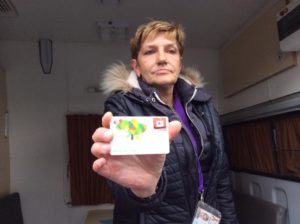
Author: Yana Kazmyrenko, Ukraine
We have spent one day with the mobile clinic in Kyiv, Ukraine, that provides HIV testing for people who inject drugs. The social worker Tatiana quit using drugs and has now been diagnosing five HIV cases monthly.
Tatiana Martynyuk (54 years old) visits up to 10 apartments every day, and at least five of her clients each month turn out to be HIV positive. She works at a mobile clinic of the Eney Club in Kyiv, where she anonymously detects HIV and hepatitis C. The project has been supported by ICF Public Health Alliance for more than ten years. There are five mobile teams from the organization in Kyiv and one team always works night shifts in order to cover the sex workers’ testing.
Eney has a large base of volunteers. These people actively use drugs. They offer their friends and acquaintances to pass HIV testing which only takes 15 minutes. If the test is positive, they persuade a person to go to the City AIDS Centre and register there. Not everybody agrees, half of them reject saying that nothing is hurting, and they will not go anywhere.
We have the meeting on Shevchenko Square, the northern outskirts of Kyiv. Our first clients live not so far away. Tatiana brings them HIV tests, alcohol wipes and condoms.
Boiling shirka
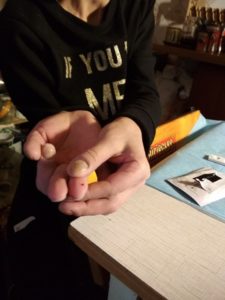
Sergey and Irina are meeting us in their one bedroom apartment, where everything is filled up with their belongings. The owners have been planning to renew the closet for several years already, but they have no money and energy for that. Irina, 43 years old, takes the test first. She is already receiving services from Eney.
“I tried drugs two years ago and I liked it,” she is saying, hiding her cracked hands. Ira has been working as a dishwasher, but currently she has no income as the restaurant is being closed.
The woman is getting nervous and takes a cigarette from Tania. The social worker asks Ira to do the test on her own so that she can do the test without any help in case of emergency. A drop of blood, four drops of the special liquid, and a long ten-minute waiting during which Tatiana has the time to ask what Ira knows about HIV.
“The most important thing: HIV can be in shirka (the popular name for one of the most commonly injected opiate derivates,) where a syringe was put for just a second. If in doubt – boil shirka,” Tatiana is instructing, asking other people to leave the kitchen. The HIV test result is strictly confidential.
Ira is satisfied with the test results, and she is going to wash the dishes. The 33-year-old Sergey is sitting at the table. It was he who “tricked” his female partner into trying drugs. He has been using drugs for 10 years.
Our client is not interested in getting the information about HIV: he is arguing, and saying that you can get HIV while visiting a dentist. Tatiana changes the subject and asks him to invite his friends for the check. Initially, three more people were willing to take the test, but at the end, only 28-year-old Artem came in. He has a rich biography, which includes a 10-year record of drug usage and imprisonment.
“If I want – I will take the drug. If I decide to quit it – I will quit it. I am not in the system. I earn 18,000 hryvnia (about 600 euros) on repairs and construction sites. I can do everything,” he boasts while lighting up a cigarette.
Receiving assistance from their peers
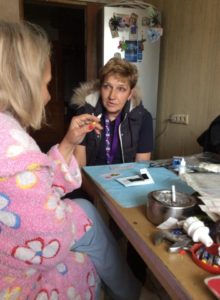
While we are driving, Tatyana keeps telling her story: she has been injecting drugs for 25 years, and then she quit. She was tired and wanted to change her life. Her husband died, her son was drinking alcohol, and her mother is sick. At first, she found work as a street sweeper, but then she settled in Eney Club.
“I get more tired at this job than when I was sweeping the streets. Everyone needs to talk and to be heard, I need to organize things. I am not judging anyone. These people will only accept a help from a person like they are,” she shares.
It seems that with each visit to the next apartment, Tatiana challenges her willpower. She could possibly get her dose of drugs in any such place. Nevertheless, she is holding on. In her situation, one needs to have a special talent in order not to lose the spirit and to do the work with all your heart.
Needle veteran
Vladimir is having a holiday in his apartment in Obolonsky Lipky, the elite district in Kyiv. His prison sentence for the distribution and transportation of drugs has been changed into the conditional one. This was the fourth prison sentence for the 54-year old Kyiv citizen.
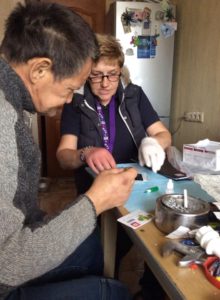
“I have been injecting drugs for 35 years now. I wonder how I survived. Everybody with who I started, is already dead. I prepare everything myself as I know all the recipes. I have studied the 1938 medical military handbook,” Vladimir is saying.
“Vova, you are such a fine fellow,” admires Tanya. The toothless Vova smiles and invites us to see his bathroom, where he has recently changed the tiles.
Vladimir takes the test and tells that he is going to get tooth implants and will start taking care of his health.
“I would not survive without drugs. I got all possible strains of hepatitis and in this way, I keep myself in shape,” he explains.
Vladimir’s elder brother is 59. He has been trying to quit drugs after a stroke. He smells of alcohol – he has been drinking vodka.
“That is how life used to be. In the 90s you would make a whole basin of shirka and you treat the whole district, but times changed and shirka is not the same anymore. We had loads of heroin,” he recalls with nostalgia.
The wives of the two brothers, Inna and Irina, also use drugs. During the test, Inna tells Tatiana to hurry up. She did not have time for injecting the dose, and now she cannot wait to get it.
Improving personal life
“Can you imagine this? I woke up in the morning and noticed that I lost my tooth and ate it in my sleep,” Marta is saying. She works as a hairdresser and has colorful hair.
Marta has been using drugs since she was 12. She says that drugs in Kyiv in the 80s were an element of prestige like a cherry VAZ 2109 (car model.) There was a seven-year break in her history. She started using drugs all over again when she had found out that her first love was HIV positive.
“He died, and I went crazy. In general, I cannot live without injecting. It is an addiction,” she explains.
Marta tries to take the test once a year, and she is going to improve her personal life.
“Tania, please, give me more condoms. My friends have been searching for a fiancée for me. I imagine him taking drugs, but not being a goner; I want him to have an apartment, as I would like to give birth to a child,” she continues.
Tania asks Marta to take her friend for the testing next time. A woman with a dark hair bandage is nervously waiting for her friend. She has recently become a widow, her husband died because of an overdose.
The social base of drug users is expanding
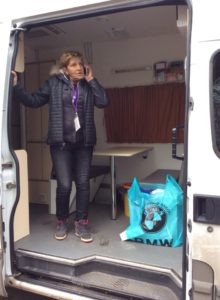
After three visits, the social worker is tired, but there are still some addresses from the other side of the city.
“Our program helps them to be safe and control their health. I would also like to add some food arrangements – some of them do not have any food for weeks,” Tania is saying.
The harm reduction program among people who inject drugs in Eney Club started in 2001. The annual coverage was more than 6000 people in 2016. Out of these number, 80% of people have been tested for HIV. Now, the average level of HIV detection among clients is 3.5%, where 80% of people have been placed on dispensary records. The level of drug usage has been growing in Kyiv. There appeared separate subgroups among the people who use drugs. Veterans of the Donbas conflict and immigrants from the Eastern Ukraine form such subgroups.



